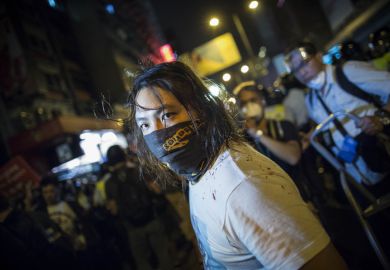On 20 January, Hong Kong’s eight universities reopened after a tumultuous six months. A week later, they shut for the Chinese New Year break, and they remained closed to inhibit the spread of the novel coronavirus that has become a global pandemic. Universities offered distance learning and quarantined students who had recently returned from mainland China.
In November, authorities locked down two of Hong Kong’s universities amid confrontations between violent anti-government protesters and riot police. Universities closed their campuses, cancelled classes and offered students distance learning. Large numbers of mainland Chinese and overseas students caught up in the conflict left Hong Kong. When the dust settled, universities began counting the cost of the protests, not just to their physical plant, but to their security, autonomy, sense of community and reputation.
Despite Hong Kong’s miserly investment in research and development – it accounts for only 0.79 per cent of gross domestic product, compared with more than 2 per cent in Singapore and mainland China – our universities have done reasonably well, providing a home to two of the world’s top 50 universities. They consistently rank highly in part because so many of their staff and students come from outside Hong Kong. Mainland and overseas students have contributed significantly to this result, driving our local universities to be more competitive.
In this context, mainland education policy has sought to bring universities in Hong Kong into the national development project. The mainland has invested in higher education in Hong Kong, providing research funding, land, buildings, equipment and access to the mainland; opportunities for collaboration; and globally competitive staff and students. The mainland has provided these “carrots”, mostly to support STEM subjects, since the 1990s.
However, in November, after five months of anti-government protests, the Chinese Communist Party adopted policies that sought in part to correct perceived failings of our schools and universities. The party is particularly critical of the fact that our education system does not build patriotism and support for party policy. Authorities are now more willing to punish universities for failing to toe the official line, using many different tools, including finance.
Colonial-era institutions, particularly the University Grants Committee, help to maintain the relative autonomy of our universities. The UGC distributes funding to universities based on government priorities, university bids and competition among the universities, buffering them from direct government control. This arrangement provides considerable “freedom of action” for universities, within a framework of financial dependence. Using financial levers to punish universities for political failings would be a new departure from these arrangements.
Still, the government plays a major role in university governance. It appoints significant numbers of university council members, as well as each council’s chair. Hong Kong chief executive Carrie Lam is the chancellor of each university, and this is not a ceremonial role. During the political crises that Hong Kong has experienced since 2014 – Occupy and the recent protests – these arrangements have brought community-wide political conflict directly on to campuses. Government supporters in university councils demand that protesters be disciplined and fired for their defiance of authority. A tenure system has so far protected university staff from arbitrary dismissal.
Because our universities are embedded in society, social conflicts from the community seep unavoidably on to campus. Conflict between locals and mainlanders in Hong Kong, fostered by China’s meteoric rise, globalisation and competition, illustrates this. Protest in Hong Kong has galvanised mostly locals. Mainland staff and students have looked on in disbelief. Why challenge authority? they ask. Civil discourse has suffered and distrust among colleagues and of authority grown.
Universities seek to produce autonomous citizens who contribute to society. We should recognise that peaceful protest – a form of social action – demonstrates engagement and the will to find solutions to society’s problems. To be more effective at engaging the mainland, Hong Kong needs a deeper and more critical grasp of developments on the mainland. Reform of our education system to teach critical Chinese history to all citizens is an absolute necessity.
The Hong Kong government must recognise and protect the autonomy of our educational institutions. This means pushing back when party supporters make unreasonable demands to punish universities for perceived political failings. On campus, universities must proactively address tensions between local and mainland students, encouraging more collaboration.
To do well, Hong Kong’s universities must regain the confidence and trust of the mainland. Such a process is a two-way street. Mainland political authorities must loosen their ideological blinkers and gain a deeper understanding of the dynamics of Hong Kong society, which is still locked in a colonial time warp. They need to consider how best to reform Hong Kong’s tycoon-dominated economy, church-led education system, and colonial civil service and political institutions.
Without changes, Hong Kong faces a bleak future of escalating cycles of protest. Only fundamental reform will enable people in Hong Kong to regain trust in their institutions, a prerequisite for effective governance and development. The public health emergency has only delayed what must be done.
John P. Burns is emeritus professor at the University of Hong Kong.
Register to continue
Why register?
- Registration is free and only takes a moment
- Once registered, you can read 3 articles a month
- Sign up for our newsletter
Subscribe
Or subscribe for unlimited access to:
- Unlimited access to news, views, insights & reviews
- Digital editions
- Digital access to THE’s university and college rankings analysis
Already registered or a current subscriber?








